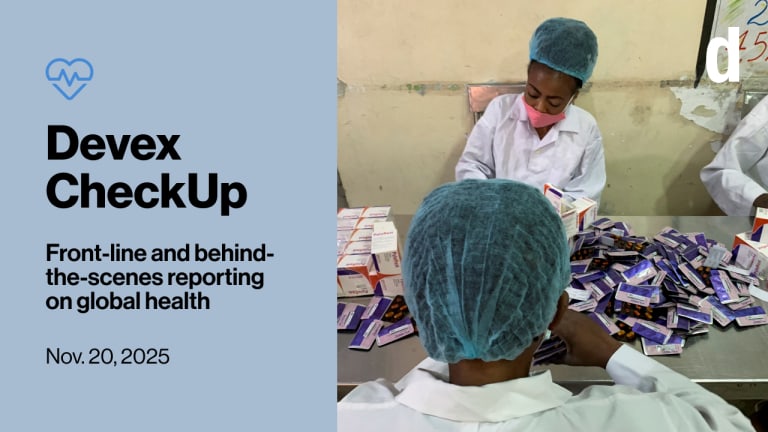
STOCKHOLM — Sexual and reproductive health and rights NGOs struggling to deliver services in the wake of the United States “global gag rule” have spent a year caught between donors, after the Swedish aid agency, a key funder of sexual and reproductive health and rights, said it could not support organizations that go along with the rule. That decision, activists told Devex, is unintentionally making life harder for them on the ground.
Non-U.S. organizations working on SRHR were left scrambling for funding after President Donald Trump reinstated the gag rule, also known as the Mexico City Policy, soon after his inauguration in Jan. 2017. Under the order, foreign NGOs that receive any U.S. global health assistance are banned from performing or promoting abortion as a method of family planning. That includes offering legal advice or counselling. Organizations that refuse to comply have seen their U.S. funding cut off.
More on the impact of the ‘global gag rule:’
► One year on, full impact of ‘global gag rule’ begins to emerge
► An atmosphere of fear under ‘global gag rule’ shows comprehensive new report
► As She Decides marks one year, celebrations and questions over its future direction
At the time of the order, a coalition of donors led by the Dutch government made an effort to fill the funding gap for noncompliant organizations. The resulting She Decides movement has raised approximately $450 million, but up to $2.2 billion in U.S. funding could be affected by the rule. Marie Stopes International and the International Planned Parenthood Federation, the two groups hit hardest, have already lost an estimated $80 million and $100 million in U.S. funding.
Sweden, one of the largest global donors to SRHR, has been a vocal critic of the rule, contributing approximately $22 million to She Decides. In July 2017, the Swedish International Development Cooperation Agency announced it would withdraw funding from groups contracted to carry out SRHR programs if they complied with the U.S. rule. Sida argues that compliance with the gag rule would interfere with a contractor’s ability to carry out Swedish-funded SRHR services.
But advocates have described the move as a “counter-condition” and say it is forcing NGOs to choose between U.S. and Swedish funding. They also say it has led to some Sida subgrantees having their contracts cancelled.
Sida told Devex it has not had to cancel any contracts with grantees as a result of its position but admitted subgrantees may have been affected. It said this was the partners’ responsibility and not the agency’s.
According to a statement on Sida’s website: “If a Sida partner within SRHR decides to comply with the [global gag rule], it could lead to the organisation not being able to carry out all or some of the activities agreed with Sida. Sida may then be forced to phase out the SRHR funding for the organisation and consider whether funds may be reallocated to another partner that can implement the planned activities.”
Serra Sippel, president of advocacy group Center for Health and Gender Equity, said that while she was “sympathetic” to Sweden’s position, and appreciated the agency's efforts to work directly with groups to find a solution, the condition was having negative impacts in the field.
“Civil society is getting caught in the middle of politics …[and] it really shows how, when donors take these principled positions, they can and do have unintended consequences for groups in countries who are desperate for the funding to provide life-saving health services,” she said.
In practice, she added, Sida’s policy, like the U.S. rule, is an example of “aid conditionality,” although she does not see the two as equivalent.
Sida’s Director-General Carin Jämtin told Devex that the decision was not based on “ideology” but rather on “scientific truths and facts” which show that access to legal and safe abortion makes for better health policy. Sida has opted to clarify its position to partner organizations that it views abortion information and services an integral part of successful SRHR work in light of Trump’s gag rule, she said.
“We are, of course, very important moneywise but we are even more important, I think, when it comes to setting moral standards around women’s rights.”
— Carin Jämtin, director-general at SidaJämtin confirmed that none of Sida’s primary partners have lost funding as a result of the decision. “Thus far, none of our partner organizations have followed the gag rule [and] so we have not stopped funding any of our partner organizations,” she said.
But she could not say whether subgrantees had been affected, and said it was the responsibility of primary partner organizations to make sure their own partners fulfill their funding agreements. She said she is aware of one Sida partner that has reduced funding for some subgrantees that are complying with the gag rule.
Asked about the potential negative impact Sida’s stance could have on SRHR organizations, the director-general, who took on the job last year, said: “They have their choice … to stick to the Mexico City Policy and sign up to that and then they will get U.S. support but not Swedish support.”
Acknowledging Sweden’s limited financial resources compared to that of the U.S., Jämtin, who was minister for international development cooperation between 2003-2006, said Sweden hoped to influence U.S. government policy through its decision.
“We discuss and debate and have always been open with the U.S. administration on our position on gender equality and SRHR ... We are of course an important donor … but we have a smaller budget than the U.S. … We are, of course, very important moneywise but we are even more important, I think, when it comes to setting moral standards around women’s rights,” she said.
Heather Benjamin, a program officer at the Open Society Foundations, said that a number of its grantees working on SRHR who also received funding from Sida for the same work, had expressed concerns about the counter-conditionality requirement. Some said it had led them to stop subcontracting to groups who have signed the gag rule.
“Even though Sida is not telling prime partners whether or not they can partner with gagged subrecipients, prime partners are severing ties with gagged groups because they are concerned about how Sida would perceive them,” Benjamin told Devex.
None of OSF’s prime grantees were willing to talk on the record for fear of damaging their relationship with Sida.
Benjamin said Sida’s policy could have major funding consequences for aid groups, especially since Trump’s version of the gag rule applies to all U.S. global health assistance, as opposed to only U.S. family planning funds as was the case under previous Republican administrations.
“When a group walks away from U.S. funding it also walks away from HIV funding ... Sida doesn’t have as much funding as the U.S. [and] so it cannot fill [the] funding gap this creates,” Benjamin said.
Instead of freezing out organizations who opt to comply with Trump’s gag rule, Sippel called on Sida to work with NGOs affected by the rule to help them find ways of working around it.
“The answer is not to cut and say ‘choose between U.S. and Sida funding.’ The practical and compassionate thing would be to work [with gagged organizations] on what they are still able to do,” Sippel said.
This could include taking advantage of the various exceptions within the U.S. order, which are not currently widely known about or taken up, Sippel said. The exceptions allow U.S. funded practitioners to carry out abortions in cases of life endangerment, rape or incest, and to provide post-abortion care.
They can also engage in “passive referrals,” whereby health practitioners can provide information about where to obtain a safe, legal abortion to a woman who has already made up her mind to have one. A third exception exists where a country's local law requires providers to give women information and referrals to access abortion services, such as in South Africa.








